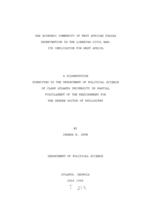- Collection:
- Atlanta University and Clark Atlanta University Theses and Dissertations
- Title:
- The economic community of West African states intervention in the Liberian Civil War: its implication for West Africa, 1998
- Creator:
- Ikpe, Ibanga E.
- Date of Original:
- 1998-07-01
- Subject:
- Degrees, Academic
Dissertations, Academic - Location:
- United States, Georgia, Fulton County, Atlanta, 33.749, -84.38798
- Medium:
- theses
- Type:
- Text
- Format:
- application/pdf
- Description:
- More often than not, when regional powers involve themselves in a country where conflict is present, there is always the implication that intervention can: (a) buttress an otherwise fragile regime; (b) assist in neutralizing threats; (c) allow a regime to consolidate power; (d) help rejuvenate the state; (e) extend the conflict; and (f) bring conflict to an end or quickly reduce its scale. The purposes of intervention vary depending on the interests of the regional powers and the strengths and motivation of contending groups engaged in civil conflict. This study demonstrates that the economic community of West African State's initiative brought an end to the Liberian civil war and helped forge regional unity among West African States. Since the creation of modern Liberia in 1821, the country has experienced repression, denial of basic rights, and socioeconomic inequalities. These conditions set the stage for the military takeover of April 12, 1980 led by Master-sergeant Samuel K. Doe who overthrew the William Tolbert regime. Doe's continuation of his predecessors' policies and administrative style, combined with his own lack of experience in governance, and dismal performance, promoted discontent among the Liberian majority, such as the Krus Krelles, Grebo, and Gbande. On December 24, 1989 civil war broke out. This study identifies internal factors leading to civil war such as Liberia's historical legacy, the nature and basis of the Liberian government, its policies, and the means and effectiveness with which the Liberian government enforced its authority. Hoping to resolve the Liberian conflict, the Economic Community of West African States (ECOWAS) formed a monitoring group, Economic Community of West African States Monitoring Group (ECOMOG), to intervene and bring the war to an end. The study's conclusion is that ECOMOG has the potential to bring peace, stability, economic growth and good governance to Liberia, and help forge unity among West African states. The war has created an enormous refugee problem and economic hardship for Liberia, and has threatened the health, security, and stability of the West African region. This study recommends that the gap between the impoverished masses and the elite in Liberia be bridged.
- External Identifiers:
- Metadata URL:
- http://hdl.handle.net/20.500.12322/cau.td:1998_ikpe_ibanga_e.pdf
- Rights Holder:
- Clark Atlanta University
- Holding Institution:
- Atlanta University Center Robert W. Woodruff Library
- Rights:
-
